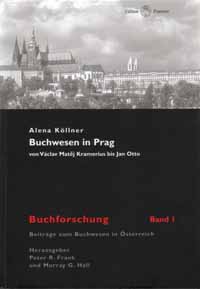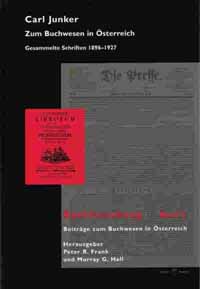Buchforschung. Beiträge zum Buchwesen in Österreich. Edited
by Peter R. Frank und Murray G. Hall. Vienna: Edition Praesens (from Volume 4: Wiesbaden. Harrassowitz Verlag).
About this series

Volume 1:
Alena Köllner: Buchwesen in Prag
Von Václav M. Kramerius bis Jan Otto. Vienna: Edition Praesens
2000. ISBN 3-7069-0041-6, Hardcover, 23 x 16 cm., 178 pp., 24 Ill.,
4 suppl. A: € 36.- , D: € 35.-
Until the collapse of the Habsburg Monarchy in 1918, Prague was, second
only to Vienna, the most important centre for the bookselling, printing
and publishing trades in the Austro-Hungarian Empire. Due to the extensive
production of books in the German language as well as in Hebrew, Prague
was a symbol of the multi-ethnic character of the Monarchy. Situated geographically
between the book centre of Leipzig on the one hand and Vienna on the other,
Prague served as a type of mediator between the German and the Austrian
book trade.
Köllner´s study covers a considerable spectrum, presenting demographic
statistics, raising the question of the social fabric, education levels
and literacy, pirate printing, reading rooms and lending libraries. The
work also points to important authors and works in the various publishing
company programmes (Bolzano, Dobrowsky, Doppler, etc.). The major focus
is on the gradual revival of the Czech book and publishing business from
Kramerius to Jan Otto as well as the conflicts between the German-Austrian
and the Czech members of the booksellers guild. Köllner´s study documents
for the first time the degree to which the book trade played a decisive
role in the emergence of a "Czech Renewal", of a national awakening. The
volume also includes a complete list of the printers, booksellers and
publishers in Prague roughly between the years 1780 and 1850 and is supplemented
with information on the individual firms and secondary literature. As
a useful reference tool, the book contains an index of companies, of persons,
of place names and subjects. In 1928, Josef Volf published a brief outline
in a history of the printing trade in Bohemia and Moravia, but did not
deal specifically with the book trade. Thus the need for a study of the
book in Prague. For the very first time, Köllner has put together a detailed
and comprehensive study of the book trade in Prague from the Enlightenment
to the Age of Liberalism under Emperor Francis Joseph I, and in so doing
she has closed one of the many gaps in Austrian book history.

Volume 2:
Carl Junker: Zum Buchwesen in Österreich
Gesammelte Schriften 1896-1927. Ed. Murray G. Hall. Vienna: edition
praesens 2001. ISBN 3-7069-0058-0, Hardcover, 23 x 16 cm., 677 pp.
€ 64.-
Anyone interested in the history of the book in Austria will, sooner
rather than later, come across the publications of Carl Junker (1864-1928).
No one before or after him has done as much toward compiling what we know
today about the history of the book, whether it be in the Austro-Hungarian
Monarchy or in the Republic of Austria. As far as the significance of
his writings is concerned, it is entirely fitting to quote the words Junker
himself wrote regarding the official book trade publication, "Österreichisch-ungarische
Buchhändler-Correspondenz", which appeared from 1860: "The 50 volumes
which we now have - no matter what negative opinion some people might
hold of their contents - represent, for the future historian dealing with
the history of our book trade, a standard work, which he will have to
continually consult."
With his studies on the Austrian book trade or publishing trade, as
the case may be, Carl Junker made a contribution which even today, more
than seventy years after his death, defies comparison. The state of research
reflected in his articles and lengthier studies, his monographs, is, in
most cases, the same as it is today. Archival material which he had at
his disposal and which he used as the basis for his studies is no longer
available today. Thus, his documentations have, in many respects, become
"primary sources" in their own right. His text "Die Katastrophe in Wien",
for example, is an authentic report on the loss of irreplaceable archival
records from the "Staatsarchiv des Innern und der Justiz", stored in the
Palace of Justice which went up in flames in 1927. The losses included
censorship and police records from the reign of Joseph II and records
pertaining to the newspaper trade. As Junker reports, little was left.
The volume of Junker\'s collected writings contains all of his book publications,
including monographs of firms such as Gerold, Hölder-Pichler-Tempsky and
Friedrich Jasper as well as his critical analysis of the state of copyright
protection in Austria-Hungary at the turn of the century, not to mention
his pioneering publication on Austrian press history (the likes of which
has not been published since.) As the collection of Junker\'s writings
shows, he was also very much interested in developments in bibliography,
as, for example, decimal classification in libraries. Junker also wrote
histories of two trade organizations in Austria, the "Verein der österreichisch-ungarischen
Buch-, Kunst- und Musikalienhändler" (1899) and the "Korporation der Wiener
Buch-, Kunst- und Musikalienhändler" (1907). Both works contain information
(e.g. legislation governing the book trade) essential to today\'s book
scholars. But the current volume also makes other historical topics easily
accessible to us today. There are articles about the reorganisation of
the Austrian book trade after World War One, articles he wrote articles
for countless exhibition catalogues. And although some of his works were
commissioned, Junker shows on repeated occasions that he is by no means
uncritical. Junker died in 1928 before he could complete one last major
work, namely a history of book publishing companies in Austria. What he
did leave behind is contained in this volume and can provide the basis
for scholars today to try to match his diligence. A compilation of this
kind will invariably be used as a reference work, and in order to make
the incredible wealth of information easily accessible, there are five
indices: company names, personal names, subject, place names and magazines
and newspapers.
Volume 4: Peter R. Frank, Johannes Frimmel: Buchwesen in Wien 1750 –1850. Kommentiertes Verzeichnis der Buchdrucker, Buchhändler und Verleger. Wiesbaden: Harrassowitz 2008. ISBN 978-3-447-05659-5. € 72,− (D) / sFr 122,−.
Volume 5: Johannes Frimmel/Michael Wögerbauer (Hrsg.): Kommunikation und Information im 18. Jahrhundert. Das Beispiel der Habsburgermonarchie. Mit einer um Informationen zur Verteilung der Befugnisse, Adressen und Biographien wesentlich erweiterten Fassung im PDF-Format auf CD-ROM. Wiesbaden: Harrassowitz 2009. ISBN: 978-3-447-05918-3. € 58,- (D).
Volume 6: Katharina Bergmann-Pfleger: Geschichte der Universitätsbibliothek Graz 1938 – 1945. Wiesbaden: Harrassowitz 2011. ISBN: 978-3-447-06569-6. € 64,- (D).
Volume 7: Die Bienen fremder Literaturen. Der literarische Transfer zwischen Großbritannien, Frankreich und dem deutschsprachigen Raum im Zeitalter der Weltliteratur (1770–1850). Herausgegeben von Norbert Bachleitner und Murray G. Hall. Wiesbaden: Harrassowitz Verlag 2012. ISBN: 978-3-447-06788-1. 72,00 Eur[D] / 74,10 Eur[A] / 95,00 CHF.
|